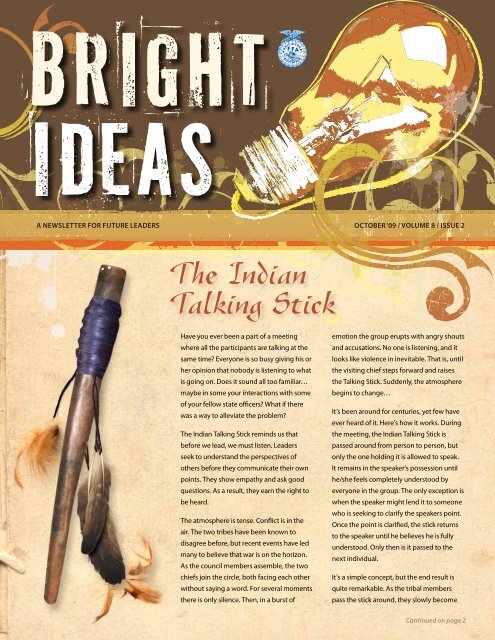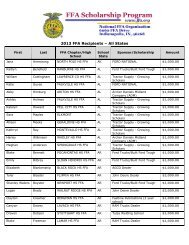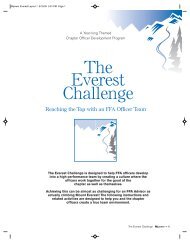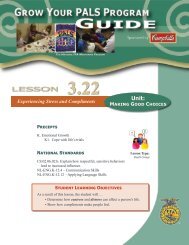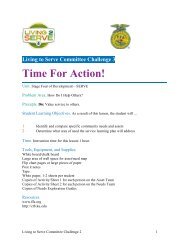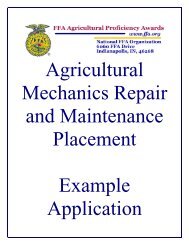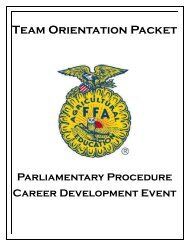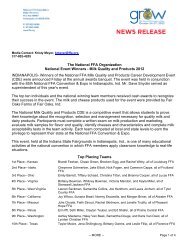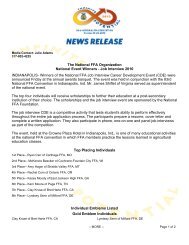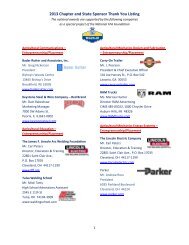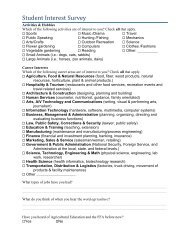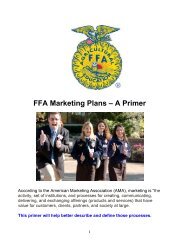The Indian Talking Stick - National FFA Organization
The Indian Talking Stick - National FFA Organization
The Indian Talking Stick - National FFA Organization
You also want an ePaper? Increase the reach of your titles
YUMPU automatically turns print PDFs into web optimized ePapers that Google loves.
a newsletter for future leaders october ‘09 / volume 8 / Issue 2<br />
<strong>The</strong> <strong>Indian</strong><br />
<strong>Talking</strong> <strong>Stick</strong><br />
Have you ever been a part of a meeting<br />
where all the participants are talking at the<br />
same time? Everyone is so busy giving his or<br />
her opinion that nobody is listening to what<br />
is going on. Does it sound all too familiar…<br />
maybe in some your interactions with some<br />
of your fellow state officers? What if there<br />
was a way to alleviate the problem?<br />
<strong>The</strong> <strong>Indian</strong> <strong>Talking</strong> <strong>Stick</strong> reminds us that<br />
before we lead, we must listen. Leaders<br />
seek to understand the perspectives of<br />
others before they communicate their own<br />
points. <strong>The</strong>y show empathy and ask good<br />
questions. As a result, they earn the right to<br />
be heard.<br />
<strong>The</strong> atmosphere is tense. Conflict is in the<br />
air. <strong>The</strong> two tribes have been known to<br />
disagree before, but recent events have led<br />
many to believe that war is on the horizon.<br />
As the council members assemble, the two<br />
chiefs join the circle, both facing each other<br />
without saying a word. For several moments<br />
there is only silence. <strong>The</strong>n, in a burst of<br />
emotion the group erupts with angry shouts<br />
and accusations. No one is listening, and it<br />
looks like violence in inevitable. That is, until<br />
the visiting chief steps forward and raises<br />
the <strong>Talking</strong> <strong>Stick</strong>. Suddenly, the atmosphere<br />
begins to change…<br />
It’s been around for centuries, yet few have<br />
ever heard of it. Here’s how it works. During<br />
the meeting, the <strong>Indian</strong> <strong>Talking</strong> <strong>Stick</strong> is<br />
passed around from person to person, but<br />
only the one holding it is allowed to speak.<br />
It remains in the speaker’s possession until<br />
he/she feels completely understood by<br />
everyone in the group. <strong>The</strong> only exception is<br />
when the speaker might lend it to someone<br />
who is seeking to clarify the speakers point.<br />
Once the point is clarified, the stick returns<br />
to the speaker until he believes he is fully<br />
understood. Only then is it passed to the<br />
next individual.<br />
It’s a simple concept, but the end result is<br />
quite remarkable. As the tribal members<br />
pass the stick around, they slowly become<br />
Continued on page 2
less combative and more cohesive. Each<br />
person feels like his or her view is getting a<br />
fair hearing. Before long, the real source of<br />
the conflict is revealed, and new solutions<br />
begin forming. War is averted. Relationships<br />
are restored. All because the focus is on understanding,<br />
not just being understood.<br />
Without question, the greatest emotional<br />
need of people today is the need to be<br />
understood. And to understand, we must<br />
listen. Leaders have to get this. If they don’t,<br />
it doesn’t matter how intelligent, gifted, or<br />
charismatic they are. <strong>The</strong>y will ultimately fail<br />
to connect with others and end up sabotaging<br />
their true potential. It’s not easy. Most of<br />
us aren’t naturally good listeners. We have<br />
to work at it, being diligent and alert to the<br />
needs around us.<br />
When it comes to listening, leaders simply<br />
cannot afford to fall asleep on the job. Often,<br />
as much as 50 percent of leaderhsip is about<br />
To start with we have to identify the<br />
bad listening habits we may have<br />
picked up over the years:<br />
✵ Judgemental Listening-Jumping to<br />
conclusions about the speaker.<br />
✵ Selective Listening-Only hearing<br />
what you want to hear.<br />
✵ Impatient Listening-Finishing other<br />
people’s sentences, interrupting<br />
them.<br />
✵ Egocentric Listening-Think about<br />
what you’ll say as others are talking.<br />
✵ Patronizing Listening-Pretending<br />
to listen, but really off in your own<br />
world.<br />
✵ Stubborn Listening-listening, but<br />
not open-your mind is already<br />
made up.<br />
1 <strong>The</strong> <strong>Indian</strong> <strong>Talking</strong> <strong>Stick</strong><br />
3 Stationed by the Hole Punch<br />
listening, observing and interpreting what<br />
we see and hear. So how do we learn to do<br />
this well? How do we practice the <strong>Indian</strong><br />
<strong>Talking</strong> <strong>Stick</strong> in our everyday lives?<br />
Can you relate to any of these common pitfalls?<br />
Your ability to move past them will<br />
have a profound impact on your leadership.<br />
If you want to become a great listener, you’ll<br />
need to work on two things: showing empathy<br />
and asking good questions.<br />
Show Empathy<br />
Empathy is about entering into another<br />
person’s situation. It involves understanding<br />
how others feel and showing that you<br />
genuinely care. Counselors are usually great<br />
at this. You’ll see them nod and show concern<br />
in their faces and display real interest in<br />
what you are saying. When they listen, you<br />
feel understood and your emotions are validated.<br />
And when they finally do speak up,<br />
you’re all ears. WHY? <strong>The</strong>ir ability to listen<br />
has earned them the right to be heard. It is<br />
the same with us, when we listen empathetically<br />
to others they become receptive to<br />
what we have to say in return.<br />
Ask Good Questions<br />
Showing empathy is important, but so is<br />
asking relevant questions. Stop for a second<br />
and recall the last time you visted the<br />
dontor’s office. Did the doctor just barge<br />
through the door and immediately give<br />
you a diagnosis based on the way you look?<br />
Doctors take the time to look into your<br />
eyes, listen to your hertbeat, etc.. Only after<br />
poking and prodding will they give you a diagnosis<br />
Have you learned to poke and prod during<br />
your conversations with others? Or, do you<br />
make assumptions and jump to conclusions?<br />
How you answer says a lot about your listening<br />
ability. Many leaders believe they are<br />
supposed to have answers and not questions.<br />
<strong>The</strong>y never ask, afraid they will appear<br />
4 Five Levels of<br />
Leadership<br />
5 Collegiate Corner<br />
6 Trainer’s Corner<br />
7 Wit and Wisdom<br />
weak. Asking good questions doesn’t make<br />
you appear weak; well-placed questions<br />
help you connect with people and understand<br />
where they are really coming from. It is<br />
a sign of strength.<br />
<strong>The</strong> <strong>Indian</strong> <strong>Talking</strong> <strong>Stick</strong> reminds<br />
leaders that if they want to<br />
connect with others, they must<br />
first learn how to listen.<br />
How does this idea relate to you as a state of-<br />
ficer? Let’s first apply it to your team dynam-<br />
ics. Have there been times where the tension<br />
was thick and everybody was busy giving<br />
their own opinions and not listening to each<br />
others? This is a dangerous place for a team<br />
to be because it builds walls and team members<br />
lose sight of why they are here. Think<br />
about your team environment. How could a<br />
talking stick help you accomplish your team<br />
goals?<br />
Now apply this concept of listening to your<br />
role as a state officer. How important is it<br />
that you are listening to those you are serving?<br />
How will improving your listening skills<br />
enhance your influence as a leader for your<br />
association? Think how much more you and<br />
your teammates could accomplish if you<br />
start by doubling the amount of time you<br />
spend listening instead of talking.<br />
<strong>The</strong> <strong>Indian</strong> <strong>Talking</strong> <strong>Stick</strong> reminds leaders that<br />
if they want to connect with others, they<br />
must first learn how to listen. This habit can<br />
revolutionize your day to day life. Your relationships<br />
will be strengthened and your influence<br />
will increase. It all begins with showing<br />
empathy and asking good questions.<br />
This excerpt is taken from Habitudes, by Tim Elmore,<br />
copyright 2007.<br />
8 Readers are Leaders<br />
9 News and Notes
Submit articles to Bright Ideas:<br />
By e-mail: tparis@ffa.org<br />
By fax: 317-802-5309<br />
By mail: Tina Paris,<br />
Leadership and Education<br />
Program Delivery Team<br />
<strong>National</strong> <strong>FFA</strong> <strong>Organization</strong><br />
6060 <strong>FFA</strong> Drive, P.O. Box 68960<br />
<strong>Indian</strong>apolis, IN 46268-0960<br />
the FFa Mission <strong>FFA</strong> makes a positive<br />
difference in the lives of students by<br />
developing their potential for premier<br />
leadership, personal growth and career<br />
success through agricultural education.<br />
the agricultural education Mission<br />
Agricultural education prepares students<br />
for successful careers and a lifetime of<br />
informed choices in the global agriculture,<br />
food, fiber and natural resources systems.<br />
<strong>The</strong> <strong>National</strong> <strong>FFA</strong> <strong>Organization</strong> is a<br />
resource and support organization that<br />
does not select, control or supervise state<br />
association, local chapter or individual<br />
member activities except as expressly provided<br />
for in the <strong>National</strong> <strong>FFA</strong> <strong>Organization</strong><br />
Constitution and Bylaws.<br />
<strong>The</strong> <strong>National</strong> <strong>FFA</strong> <strong>Organization</strong> affirms its<br />
belief in the value of all human beings and<br />
seeks diversity in its membership, leadership<br />
and staff as an equal opportunity<br />
employer.<br />
© 2009 <strong>National</strong> <strong>FFA</strong> <strong>Organization</strong><br />
www.ffa.org<br />
M<br />
any times we are asked the question,<br />
what does <strong>FFA</strong> stand for? When you<br />
share that <strong>FFA</strong> was formerly known as<br />
the Future Farmers of America and explain,<br />
some repeat the question but “What does<br />
<strong>FFA</strong> stand for?” Few people rarely, if ever, ask<br />
a similar question when, ABC, IBM, YMCA,<br />
www, or AAA are mentioned. However,<br />
we must approach this question as an<br />
opportunity to communicate the value and<br />
brand of <strong>FFA</strong>. I believe that <strong>FFA</strong> stands for<br />
the following:<br />
Lifelong Learning:<br />
<strong>FFA</strong> was founded on the basis that learning<br />
is a continuous process. We will never lack<br />
for an opportunity to learn. <strong>FFA</strong>, integral<br />
to agricultural education, demonstrates<br />
that contextual learning helps us to retain<br />
information and processes that can be<br />
applied in multiple lifelong situations. <strong>FFA</strong><br />
provides the opportunity to demonstrate<br />
and practice communication and leadership<br />
skills for personal development. <strong>FFA</strong><br />
members recognize that lifelong learning is<br />
essential for career success.<br />
Unselfish Service:<br />
<strong>FFA</strong> members strive to live a life of service.<br />
<strong>The</strong> <strong>FFA</strong> motto; Learning to Do, Doing to<br />
Learn, Earning to Live, Living to Serve, clearly<br />
identifies that <strong>FFA</strong> focuses on living a life<br />
of service. Throughout history, <strong>FFA</strong> has<br />
Stationed by the Hole<br />
Punch!<br />
By Steve Brown<br />
nationaL FFa execUtive Secretary<br />
continuously promoted programs focused<br />
on service to others. Programs such as<br />
Food for America, Building Our American<br />
Communities, Million Hour Challenge,<br />
Seeds of Hope, PALS and the <strong>National</strong> <strong>FFA</strong><br />
Convention Days of Service all demonstrate<br />
that unselfish service is a corner stone that<br />
<strong>FFA</strong> values.<br />
Unshakable character:<br />
Character is a choice of making the right<br />
decision, regardless if someone else is<br />
watching. It is built on trust, compassion and<br />
consistently maintaining your commitment.<br />
<strong>The</strong> unwritten legacy is that <strong>FFA</strong> makes a<br />
positive difference by valuing the worth<br />
of others regardless of circumstances. <strong>FFA</strong><br />
provides the desire to change and grow an<br />
attitude of treating all people with respect<br />
and honor. <strong>FFA</strong> members learn to develop<br />
achievable dreams and goals by making wise<br />
choices. <strong>FFA</strong> provides a solid foundation to<br />
build courage, conviction and commitment<br />
that develops an unshakable character.<br />
<strong>The</strong> hole punch provides and stands for<br />
a consistent, steady, reliable delivery of a<br />
product. So the next time someone asks<br />
you, “What does <strong>FFA</strong> stand for?” I hope you<br />
will respond by stating: FFa stands for<br />
lifelong learning, unselfish service and<br />
unshakable character.<br />
Learning to Do, Doing to Learn,<br />
Earning to Live, Living to Serve
<strong>The</strong> Five Levels of Leadership…<br />
Level Two…<br />
Let’s review-In the last issue of Bright<br />
Ideas you read level one of the five levels<br />
of leadership. Remember, in level one<br />
the only influence you have is that which<br />
comes with a title. This is a dangerous place<br />
to stay for no personal growth ever occurs<br />
and your ability to influence decreases<br />
over time.<br />
L e t’s talk abo u t<br />
L e v e l 2 - Pe rm i ssi o n<br />
Leadership is getting people to work for<br />
you when they are not obligated. That<br />
will only happen when you enter into the<br />
second level of influence. People don’t<br />
care how much you know until they know<br />
how much you care. Leadership begins<br />
with the heart, not the head. It flourishes<br />
with a meaningful relationship, not more<br />
regulation.<br />
As we know, leaders on the position level<br />
often lead by intimidation. <strong>The</strong>y are like the<br />
chickens that psychologist T. Schjelderup-<br />
Ebbe studied in developing the “pecking<br />
order” principle that is used to describe all<br />
types of social dynamics.<br />
Schjelderup-Ebbe found that in any flock<br />
one hen usually dominates all the others.<br />
She can peck any other without being<br />
pecked in return. Second is a hen that<br />
pecks all but the top hen, and the rest are<br />
arranged in descending hierarchy, ending<br />
in one hapless hen that is pecked by all and<br />
can peck no one.<br />
In contrast to this a person on the<br />
permission level will lead by interrelationships.<br />
<strong>The</strong> agenda is not the<br />
pecking order but people development.<br />
On this level, time,<br />
energy and focus<br />
are placed on the<br />
individual’s needs and<br />
desires. People who<br />
are unable to build<br />
solid lasting relationship will so discover<br />
that they are unable to sustain long<br />
effective leadership. You can love people<br />
without leading them but you cannot<br />
lead people without loving them. Think<br />
about this, If level 1 Position is the door to<br />
leadership, then level 2, Permission, is the<br />
foundation.<br />
In your journey of leadership it is important<br />
to not skip a level. <strong>The</strong> most often<br />
skipped level is number 2. Think about<br />
this. You were elected as a state officer<br />
this past spring. In your new position you<br />
immediately start focusing on producing<br />
results (level 3) for your association.<br />
It’s not all bad as you are making some<br />
things happen for the members in your<br />
state. Along the way though you missed<br />
In contrast to this a person on the permission level<br />
will lead by interrelationships. <strong>The</strong> agenda is not the<br />
pecking order but people development.<br />
a critical element that would have made<br />
you a stronger leader. You neglected<br />
the essential relationships with all the<br />
people who help you make things happen;<br />
partners, advisors, members, teammates.<br />
<strong>The</strong> end result is that your ability to<br />
influence overall has disintegrated .<br />
Eventually all that you worked for is falling<br />
apart. Never forget the importance of<br />
nurturing your relationships. What are you<br />
doing to practice level 2?
Collegiate<br />
Corner<br />
<strong>The</strong> Collegiate <strong>FFA</strong> team has<br />
been busy planning for the 2009<br />
Collegiate Convention. Collegiate<br />
Convention registration is online<br />
and easier than ever! Go to https://<br />
register.ffa.org/event/8076 to<br />
register today! Make sure to<br />
download your resume during the<br />
registration process so it can be<br />
handed out at the Career Expo!<br />
Make sure to plan to attend all of<br />
the collegiate events including our<br />
collegiate workshop on Wednesday<br />
and Thursday! Please make a<br />
special trip to the Collegiate <strong>FFA</strong><br />
booth in the Career Show to learn<br />
about the many programs and<br />
opportunities Collegiate<br />
<strong>FFA</strong> has to offer you, to see<br />
the new and improved<br />
Collegiate <strong>FFA</strong> website,<br />
and to register to win an<br />
iPod!<br />
Collegiate House Parties<br />
Plan to spend your evenings networking and having<br />
fun with your friends at the Collegiate House Parties!<br />
Thursday night from 8 p.m. – Midnight, come to<br />
Rock Bottom restaurant to watch football, eat, play<br />
pool and meet new friends! On Friday from 8 – 11<br />
p.m., plan to show off your school pride by wearing<br />
your university colors and coming to the NCAA<br />
Hall of Champions! <strong>The</strong>re will be lots of food, fun,<br />
dancing and friendly basketball, baseball, and hockey<br />
competitions!<br />
Amazing <strong>FFA</strong> Race<br />
We’ve all seen the race on TV, now it’s<br />
your chance to team up with your fellow<br />
collegiate students to put your racing skills<br />
to the test! Teams of 3-4 will compete in<br />
solve clues and completed challenges as<br />
they race around the Circle City. Teams<br />
will be competing for numerous prizes<br />
and the overall title of Amazing <strong>FFA</strong> Race<br />
Champions!<br />
Teams will meet at 6 p.m. at ICC 114 for<br />
orientation and the race. Teams will be<br />
provided all of the rules and guidelines at<br />
orientation. Teams will be provided more<br />
information after they have registered. <strong>The</strong><br />
race will begin at 6:30 p.m.<br />
on Thursday evening<br />
and will end at the<br />
Collegiate Football<br />
Watch Party at Rock<br />
Bottom restaurant.<br />
For more<br />
information on<br />
these, and other<br />
collegiate FFa<br />
programs, go to<br />
www.ffa.org/collegiate!<br />
Collegiate Career Expo<br />
<strong>The</strong> Collegiate Career Expo has<br />
moved! <strong>The</strong> Expo will be held at the<br />
East Concourse of Lucas Oil Stadium<br />
this year during the American Degree<br />
Ceremony! <strong>The</strong> Expo will run from<br />
9 a.m. to 1 p.m. on Saturday, Oct. 24.<br />
Plan to walk through the Expo during<br />
the ceremony and learn about the<br />
numerous agriculture companies that<br />
are looking for their next intern and<br />
employee!<br />
Career Finder 2.0<br />
Career Finder 2.0 is a series of<br />
session dedicated to helping you<br />
finding and securing the ideal job or<br />
internship. Come for one or all four<br />
of the sessions that focus on, making<br />
the most of career fairs, creating<br />
the perfect cover letter and resume,<br />
securing an interviewing and the<br />
art networking. We have found the<br />
top industry professionals to come<br />
in and talk about what they look for<br />
in an intern or employee, and how<br />
they hire. <strong>The</strong> sessions will begin at<br />
9:30 am on Friday, and will run over<br />
each hour and a half. Plan to join<br />
your fellow collegiate<br />
students for the free<br />
networking lunch from<br />
Noon – 1 p.m. on Friday<br />
in ICC 105-106.
play that<br />
Demonstrating how<br />
<strong>FFA</strong> can assist with<br />
financial scholarships<br />
for higher education.<br />
Brief Description<br />
During this activity, students work in small groups<br />
to list as many songs with the word “money” in them<br />
in two minutes. Each group will sing the line of the<br />
song that has the word “money” in it to the rest of<br />
the participants. If the other teams have the song on<br />
their list, then they must mark it off. <strong>The</strong> team with<br />
the most original songs with the word “money” in it<br />
wins the activity.<br />
TOTAL TIME: 10 – 15 minutes<br />
Debrief<br />
Materials<br />
★ Flip chart paper or marker/chalk<br />
board<br />
★ Marker for presenter<br />
★ One piece of paper for each group<br />
applications<br />
the Process<br />
1. Divide students into groups of four to five<br />
2. Explain the procedure<br />
a. List as many songs with the word “money” in it within two minutes<br />
b. Be prepared to sing the line of the song with the word “money” in it<br />
when it is time to present<br />
c. <strong>The</strong> team with the most original songs wins<br />
3. One at a time, have each group present one of their songs (If a team has the<br />
song on their list, then they need to mark it off)<br />
4. Debrief (example questions below)<br />
Ask the following questions to elicit discussion relating to the students’ illustrations. Allow discussion to gradually move into how<br />
<strong>FFA</strong> helps prepare students for career success through career development events, leadership programs, conferences and state and<br />
national <strong>FFA</strong> conventions, and other relevant leadership opportunities at the state and local levels.<br />
★ What is a common theme with all of these songs?<br />
★ What emotions are associated with money? (i.e. happiness,<br />
stress, greed, worry, etc.)<br />
★ What are some of your plans after you graduate high school?<br />
★ How do you plan to finance your college career?<br />
★ How might <strong>FFA</strong> help?<br />
★ What about programs within your Agricultural Education<br />
courses outside of <strong>FFA</strong>? (i.e., Supervised Agricultural<br />
Experience programs)<br />
★ Agricultural education SAE projects<br />
★ Career Success workshop<br />
This activity can be used at the beginning of a program as an overview, at the end as a review or as<br />
one of the objectives relating to career success or the benefits of <strong>FFA</strong>. In addition, it can be used in<br />
workshops for nearly any topic. Applications include, but not limited to:<br />
★ Benefits of joining <strong>FFA</strong><br />
★ Scholarships available through <strong>FFA</strong> and agricultural education<br />
6
Wit and Wisdom<br />
Most people have not heard of Morris-<br />
town, New Jersey, but just about everyone<br />
has heard of the famous organization located<br />
there. <strong>The</strong> Seeing Eye has been training<br />
dogs to guide the blind since the 1930s. <strong>The</strong><br />
training process these canines experience is<br />
truly a study in modeling high expectations.<br />
Until eighteen months of age, the puppies<br />
live with families where they are taught<br />
basic obedience skills. <strong>The</strong>y learn things<br />
such as to stay off the furniture or not to<br />
eat from the table. <strong>The</strong> future guides then<br />
return to the Seeing Eye for formal training<br />
that lasts for about four months. Two<br />
trainers often work with the dogs on the<br />
streets of Morristown. One trainer may wear<br />
a blindfold and hold the harness in order<br />
to have the perspective of someone who<br />
is blind. <strong>The</strong> other trainer shadows the pair<br />
for safety.<br />
Most dogs learn quickly, however there are a<br />
couple of lessons that are more difficult than<br />
the rest. So what is the toughest thing to train<br />
a Seeing Eye dog to do? It depends on who<br />
you ask, but two answers seem to come to<br />
the top. One is “intelligent disobedience.” If<br />
the dog is given a command to go, yet it sees<br />
“What you are speaks so<br />
loudly I can not hear what<br />
you say.”<br />
-Ralph Waldo<br />
Emerson<br />
We will always tend to<br />
fulfill our own expectation<br />
of ourselves.<br />
-Brian Tracy<br />
Application Question:<br />
What areas of your life model poor expectations<br />
for others? How can you change this?<br />
How can you help others see the power of their<br />
life as a role model? Are there examples<br />
of times when you saw someone do something<br />
positive or negative and it influenced you to do<br />
the same? A<br />
At each step of a Seeing Eye dog’s life, high<br />
expectations are modeled. For the first year<br />
Great<br />
and a half they are already learning basic obedience<br />
skills. Later, trainers will use incidents<br />
with cars, tree limbs and much more to demonstrate<br />
the correct perspective a dog needs<br />
Resource<br />
in order to do its job. Each dog also under-<br />
for<br />
stands the consequences of wrong behavior.<br />
As an officer, how do we model the expectations<br />
others have for us? Do our actions repre-<br />
Speeches<br />
a car coming, it has to know to disobey the<br />
command.<br />
<strong>The</strong> seriousness of this lesson can be demonstrated<br />
to the dog by having the trainer<br />
or blind person stage an accident with a car.<br />
<strong>The</strong> command to go is given and if the dog<br />
does proceed into the street in front of the<br />
car, the trainer may fake being hit. <strong>The</strong> trainer<br />
will fall to the ground and moan as if the<br />
car has really hurt them. <strong>The</strong> dog sees that<br />
it must disregard the command in order to<br />
protect the person it is guiding.<br />
<strong>The</strong> other tough training obstacles are tree<br />
limbs, or any other horizontal barrier. If a<br />
dog were to lead a person under a tree with<br />
limbs that were five feet from the ground,<br />
the dog would not be hurt. However, the<br />
person being guided would be struck in the<br />
face by limb. Again the trainer might show<br />
how the limb hurt them by faking pain.<br />
As one trainer aptly said, “When a dog leaves<br />
here, it must see the world from five feet<br />
off the ground, not two feet as when it first<br />
began class.” It’s the trainer’s job to help<br />
the dog get that new perspective. Doing so<br />
allows each canine to do the remarkable task<br />
of guiding the blind.<br />
sent a path others should follow? Guide dogs<br />
see expectations modeled for them one hundred<br />
percent of the time. Our lives should also<br />
aim for such a high standard if we are to effectively<br />
guide others.<br />
For more info: www.seeingeye.org<br />
Andrew McCrea is a nationally syndicated<br />
radio broadcaster, author, speaker and farmer.<br />
He is also a past national <strong>FFA</strong> Secretary. His<br />
website is: AndrewMcCrea.com<br />
Application Ideas:<br />
Provide a group of students with any<br />
activity that is timed. Allow them to<br />
complete the activity a couple of times<br />
and then ask them to set a difficult,<br />
yet attainable goal for completing the<br />
activity faster. Almost every time, the<br />
group will keep working at the task<br />
until they can reach that goal. What<br />
does this say about the power of expectations?<br />
As Brian Tracy says, “We will<br />
always tend to fulfill our own expectation<br />
of ourselves.” What standards have<br />
we set individually and as a chapter<br />
when it comes to these expectations?<br />
Could we set an even higher standard?
Leaders<br />
are Readers<br />
the Power of charm: How to win<br />
anyone over in any Situation<br />
By Bryan Tracy and Ron Arden<br />
Amacom, 2006<br />
In <strong>FFA</strong> we often describe people as having “Woo” … or the<br />
ability to “Win Others Over.” No matter how skilled, smart or<br />
experienced you may be, 85 percent of your ability to succeed<br />
at anything depends on your ability to win people over, to convince them-<br />
-to charm them. People with charm have the ability to create extraordinary rapport<br />
with anyone. <strong>The</strong> secret it this: make others feel important!<br />
Like any leadership skill, charm can be learned. In this book, Tracy unpacks how to:<br />
• Capture anyone's attention and trust within the first few seconds of meeting<br />
• Win the support of others who can help you achieve your goals<br />
• Master the body language and advanced listening techniques that will<br />
make others feel that you are focused on them<br />
• Deliver more powerful and engaging talks and presentations, and more.<br />
Warning: No strategy or guideline can replace the authentic CARE of people. So be<br />
sure to read through your heart lens and remember why you are learning these<br />
skills. Applying these ideas will help the reader gain greater confidence and selfesteem<br />
and learn how to naturally win people over.<br />
Download a preview of Chapter 1 free when you subscribe to Bryan Tracy’s free enewsletter<br />
www.briantracy.com/powerofcharm. <strong>The</strong>re are some other free assessments<br />
and tools on this website too!<br />
Go Put your Strengths to work<br />
By Marcus Buckingham<br />
This is the newest book from “strengths guru” Marcus Buckingham.<br />
Most likely you’ve taken the strengths finder assessment<br />
and you know your “top 5”—the talents that<br />
come most naturally and energize you. And you’ve spent<br />
the last year developing those talents. Now, how do you put<br />
those to work at school and in a future career? This book offers six practical, yet<br />
powerful steps to achieve outstanding performance, complete with structured<br />
exercises to help you integrate your strengths into your weekly activities.<br />
If you’ve never taken the assessment, the book comes with a code to take it<br />
online. Plus, you can download two segments of the short film “Trombone<br />
Player Wanted” for free. <strong>The</strong>se features—plus some very cool tear-out note<br />
cards—add to your learning experience and help you move from a great idea<br />
to a goal.<br />
the ten Faces of<br />
innovation<br />
By Tom Kelley<br />
Currency Doubleday, 2005<br />
Every team has a devil’s advocate.<br />
You know, those pesky<br />
personas who pride themselves<br />
as being “realistic” but<br />
really end up sucking the innovation right out of<br />
a room. In this book, Tom Kelley reveals the strategies<br />
used at IDEO, the world-famous design firm,<br />
to “foster innovative thinking throughout an organization<br />
and overcome the naysayers who stifle<br />
creativity.”<br />
Kelley identifies ten roles people can play (or hats<br />
they put on or personas they can adopt) that help<br />
innovation succeed. Each of the full color chapters<br />
is devoted to one of the personas (which, by<br />
the way, have really cool names) and includes realworld<br />
examples of “unsung heroes and teams who<br />
make innovation happen day in and day out.” <strong>The</strong><br />
personas are grouped into three main categories:<br />
1. the Learning Personas – <strong>The</strong>se personas<br />
gather information constantly in order to<br />
expand their knowledge and grow. Learning<br />
personas include: <strong>The</strong> Anthropologist, <strong>The</strong> Experimenter,<br />
and <strong>The</strong> Cross Pollinator.<br />
2. the organizing Personas – <strong>The</strong>se are organizing<br />
roles, played by people who are wired<br />
for process. <strong>The</strong>y include: <strong>The</strong> Hurdler, <strong>The</strong> Collaborator,<br />
and <strong>The</strong> Director.<br />
3. the Building Personas – <strong>The</strong>se remaining<br />
roles are generally found in the heart of the<br />
action—making the innovation happen. <strong>The</strong>y<br />
are: <strong>The</strong> Experience Architect, <strong>The</strong> Set Designer, <strong>The</strong><br />
Caregiver, and <strong>The</strong> Storyteller.<br />
This book is easy to read and would be a powerful<br />
tool in understanding and developing high performing<br />
team. Find out more about the book and<br />
check out a description of the 10 faces at: www.<br />
tenfacesofinnovation.com
9<br />
<strong>FFA</strong> Bright Ideas is made possible through sponsorship<br />
from the following organizations as a<br />
special project of the <strong>National</strong> <strong>FFA</strong> Foundation<br />
State officer programs are made possible by our<br />
generous sponsors.<br />
R<br />
Join the<br />
Nation!<br />
Have you joined <strong>The</strong> Nation? <strong>FFA</strong><br />
Nation, that is! Now, <strong>FFA</strong> members<br />
can connect with other members<br />
across the country with <strong>FFA</strong> Nation,<br />
an online community where they<br />
can create profiles, add friends,<br />
upload photos, communicate<br />
on message boards and interact<br />
with other members with similar<br />
interests.<br />
We need your help to spread<br />
the word to your state members!<br />
<strong>The</strong> online community is <strong>FFA</strong><br />
specific, so members can add<br />
information to their profile about<br />
their SAE, favorite <strong>FFA</strong> memories,<br />
their chapter office and more! On<br />
the Discussions board, members<br />
can start threads on <strong>FFA</strong> topics<br />
such as idea-sharing for <strong>National</strong><br />
<strong>FFA</strong> Week plans, tips on starting an<br />
SAE or even their favorite parts of<br />
this year’s national convention. Plus,<br />
there are groups, events, photo<br />
galleries, great giveaways and more.<br />
For details, contact Julie Woodard,<br />
317-802-4310 or jwoodard@ffa.org .<br />
ffanation.ffa.org<br />
ChECk iT ouT TodAy!<br />
Engage<br />
with <strong>FFA</strong><br />
Are you a part of our <strong>FFA</strong><br />
Facebook, Twitter or <strong>FFA</strong><br />
Nation? <strong>The</strong>n be sure to<br />
“share,” “like,” “re-tweet,”<br />
and comment on the<br />
things we post. It keeps the<br />
conversation going and helps<br />
spread the <strong>FFA</strong> word. And<br />
make sure the <strong>FFA</strong> fan page is<br />
showing up in your Facebook<br />
news feed. Scroll down to the<br />
bottom of your feed and click<br />
Edit Options.


